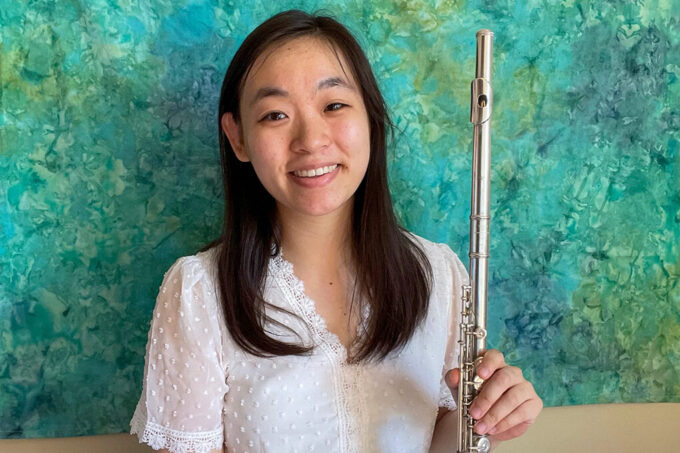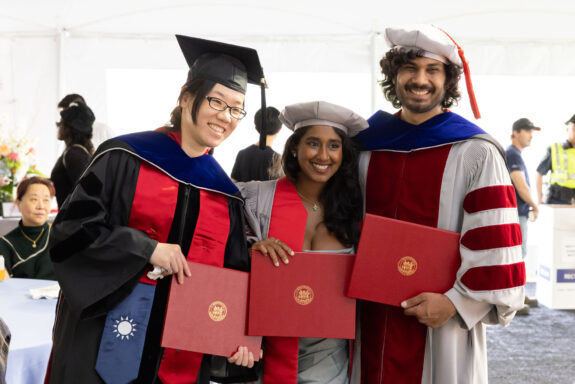Phoebe Lin ’24 awarded 2024 Louis Sudler Prize for excellence in music

2024 Sudler Prize winner Phoebe Lin ’24. Image courtesy Phoebe Lin.
For Phoebe Lin ‘24, a deep appreciation for music began as a family affair: after starting to learn piano at age 4 and picking up the flute as a teenager, she and her brother, Andrew Lin ‘22, would accompany each other playing chamber duets. Lin considered studying at a conservatory, but her interest in STEM led her to MIT, where she combined a passion for music with a major in Earth, Atmospheric and Planetary Sciences (EAPS).
“I wake up every morning and think about music,” Lin says. “But I also wake up thinking about the destruction of the world’s atmosphere, so it’s been very natural for me to blend those interests at MIT.” Lin trained in flute as a scholar in the Emerson/Harris Program for Private Study, which culminated in her senior recital on April 5 featuring a program that touched on environmental themes.
In recognition of her high level of musicianship, Lin has been awarded the $2,500 Louis Sudler Prize, an honor presented annually to a graduating MIT senior who has demonstrated excellence or the highest standards of proficiency in music, theater, painting, sculpture, design, architecture, or film.
“One of the core tenets of science and music lies in the art of collaboration,” says MIT lecturer in music Mi-Eun Kim, who was among the faculty who nominated Lin for the 2024 Sudler Prize and served as her advisor in Advanced Music Performance in the Emerson/Harris Program. “Neither discipline is solely about the pursuit of personal glory, but rather an ideal combination of humility, curiosity, hard work, talent, and tenacity, all wrapped up in some form of love,” Kim continues. “Phoebe personifies this bright, radiant love that both music and the sciences bring to the world.”
Music’s Potential for Environmental Impact
During her first year of study, while classes were remote, Lin encountered a vivid sign that led to her choice of major: the Creek Fire of 2020 turned the sky deep orange over her native Bay Area. “That was the moment when I thought, ‘The world is burning and I have to do something about it,’” Lin says. “I wound up becoming an EAPS major because I always knew I wanted to pursue public service and make a tangible impact.”
Attending a concert on campus in November 2021, Hearing Amazônia—The Responsibility of Existence, helped Lin recognize the power of music and storytelling to unite people around a global cause. Created by Frederick Harris Jr., Director of Wind and Jazz Ensembles at MIT, the project was inspired by the research and activism of Talia Khan ’20 and built upon experiences with CAST Visiting Artists Luciana Souza and Anat Cohen. The concert sought to raise consciousness around both the plight and beauty of the Amazon, with a program influenced by the rhythms of the natural world.
“Sometimes in atmospheric sciences things get politicized, and we forget that we have a shared instinct to preserve this world for future generations,” Lin says. “Music helps us bridge that gap.” Lin joined the wind ensemble and traveled to Brazil with the Hearing Amazônia Project the following year. “The purpose of the trip was to learn more about the problems facing the Amazon and collaborate with musicians there, which was a really valuable experience,” Lin says.
There was an atmosphere of community and care to the wind ensemble, due in large part to Harris’ leadership. “He’s such a beacon of hope and so welcoming in rehearsal,” Lin says. “He’s very intentional about connecting with everyone individually and making sure we have a chance to shine.”
A World of Musical Pursuits
During her time at MIT, Lin has also played with the Festival Jazz Ensemble, the Symphony Orchestra, and the Chamber Music Society, where collaborating with student composers allowed her a unique look at how music compositions evolve. “I’m so grateful for all the perspectives that I’ve gotten at MIT,” Lin says. “Being involved in so many facets of music, from arranging with the Video Game Orchestra (VGO) to having the opportunity to play so much, has been really rewarding.”
Joining the VGO, a student-run group that plays original arrangements of video game music, was among Lin’s favorite experiences at MIT, because of the excitement that members brought into the room. “I met so many interesting people through VGO,” Lin says. “There’s so much creative energy and enthusiasm around student arts organizations at MIT, which was so fun to be a part of.”
Weekly trips into Boston for private study through the Emerson/Harris Program with Cynthia Meyers, the piccolo player in the Boston Symphony Orchestra, offered Lin an immersive musical experience. “It’s been very special to be in that environment at BSO, where everyone is thinking about and practicing music,” Lin says. “Sometimes people I’ve watched play for years would walk into the dressing room and I’d get very starstruck.”
Meyers has been a supportive and upbeat mentor. “She has the most positive energy,” Lin says. “She’s aware that many of her students are pursuing STEM careers and would try to appeal to my interest in the natural world.” Lin also credits assistant professor Natalie Lin Douglas, one of her advisors in Advanced Music Performance, with encouraging her to combine her interests in music and atmospheric science.
Kim, who praised Lin’s skill and spirit in nominating her for the 2024 Sudler Prize, served as her advisor in Advanced Music Performance as well as her coach for the Collaborative Piano Studio, where Lin accompanied soprano Hyo-Sun Park, a PhD student in atomic physics. “She would give us perspective on a piece that would totally transform how we want to play it,” Lin says of Kim’s guidance.
Following MIT, Lin will pursue a master’s in atmospheric science at Colorado State University, where she plans to study convective storms and what is making them increasingly intense. “Music is such a powerful force that will always be part of my life,” Lin says. “So many facets of music, like thinking about others and collaborating, are applicable to other fields. If I don’t find the right opportunities to be involved with music in the future, hopefully I’ll try to create them.”


